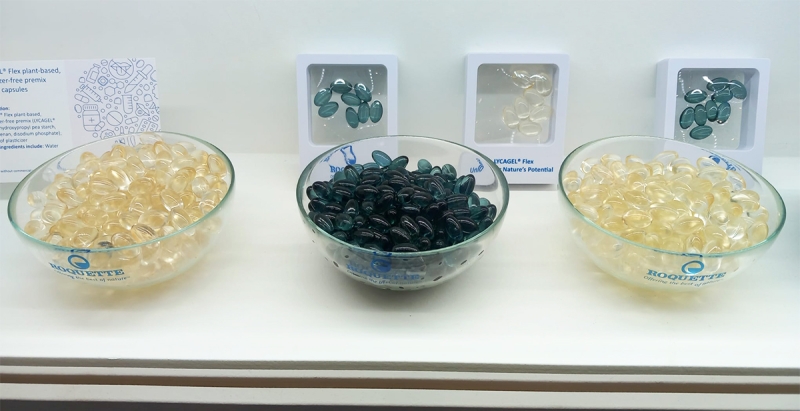Contents
20 Aug 2024 — As consumer demand for plant-based, convenient and tasty nutraceuticals soars, Roquette creates ingredient innovations to match industry themes and support its customers in developing products that stand out. We sit down with Talles Ernica, the company’s global technical developer, to discuss the company’s latest innovations, this year’s trends in supplements, the company’s target markets and how it addresses challenges from ongoing instability in multiple regions around the world.
“Top of the list regarding sensory appeal is taste, which is a significant — if not the — deciding factor for consumers when it comes to repurchasing a product,” Ernica tells Nutrition Insight. “Also driving chewable supplement sales is the need for convenient and easier-to-swallow supplements. Consumer populations like the elderly, children or those suffering from dysphagia often experience difficulty swallowing traditional tablets and so seek alternative formats.”
“Therefore, brands that can offer supplements that taste, smell and look good, along with delivering a health benefit, will have the best chance of successfully attracting and retaining attention in an increasingly crowded nutraceutical market,” he asserts.
Ernica spots chewable tablets and gummies as “hot formats” in the nutraceutical sector. “We’re seeing greater demand for a wide variety of consumer-friendly dosage forms, which sit outside the traditional solid tablet bracket. This is because consumers want a complete sensory experience from their nutraceuticals, alongside science-backed health benefits.”
“At Roquette, we have our finger on the pulse of industry themes and support our partners in producing dietary supplements that stand out, gain adoption and retain consumer loyalty. From the production of taste masking and coating solutions for better flavor to compressible excipients for smaller, easier-to-swallow tablets, we develop quality solutions that help supplement manufacturers address emerging trends and meet market demand.”
Plant-based pea starch
Ernica highlights Roquette’s Lycagel Flex as a key innovative product rolled out this year by the company.

Roquette’s Lycagel Flex is an alternative to gelatin that addresses the growing demand for vegan nutraceutical ingredients.“One of our biggest areas of innovation in recent years has been the expansion of our plant-based softgel excipient range — both to address the growing demand for vegan nutraceutical ingredients and provide a high-performance alternative to gelatin.”
“Lycagel Flex hydroxypropyl pea starch premix for softgel capsules is our latest breakthrough in the nutraceutical space, recently launched at Vitafoods Europe 2024.”
Ernica states that this plant-based, plasticizer-free premix gives manufacturers greater freedom to select optimal plasticizer combinations and customize softgel capsule formulations for a range of production and end-user needs.
“Delivering similar, if not better, performance and processability to gelatin, all while offering a plant-based alternative, Lycagel Flex sets new standards for quality, stability, and performance in softgels.”
Alternative gelling agents demand
Ernica points out that gelatin’s popularity as an ingredient in dietary supplements has diminished as alternatives continue gaining traction.
“Gelatin has long been considered the gold standard excipient for softgel capsules. However, the processing and stability issues common to gelatin formulations are equally enduring, such as crosslinking in the presence of some active ingredients,” he details.
“With this in mind, there’s tangible demand for alternative gelling agents that replicate and improve gelatin’s performance.”
He adds that many consumers aren’t only intrigued by vegan products — they expect them.
“At Roquette, we recognize gelatin’s drawbacks and understand that plant-based products are a mainstay in the consumer healthcare market. Our Lycagel Flex softgel solution provides a versatile plant-based alternative to gelatin and supports a wide range of nutraceutical applications.”
“We work closely with customers during every step of their product’s journey, including opportunities to collaborate and conduct trials at Roquette Innovation Centers worldwide. In fact, our US Pharmaceutical Innovation Center recently celebrated its one-year anniversary.”
Mannitol starch
Another one of Roquette’s significant recent innovations, highlighted by Ernica, is the mannitol and maize starch blended supplement Pearlitol ProTec with proven shelf life stability. He describes it as a solution that improves the production of tablets with moisture-sensitive active ingredients.

Pearlitol ProTec co-processed mannitol starch improves the production of tablets with moisture-sensitive active ingredients.“In the manufacturing of vitamins and probiotics, achieving the correct dosage presents a significant challenge, as stresses during direct compression and other processes can lead to the degradation of the active ingredient,” he explains.
“To compensate, manufacturers sometimes overload formulas with active ingredients, leading to high production costs and increased waste. We developed Pearlitol ProTec co-processed mannitol starch to help tackle this issue.”
Ernica states that the product’s low water activity and high compactability performance solution provides a protection of moisture-sensitive ingredients and the capacity for lower material use in the initial loading process.
“This results in an enhanced end product and a more efficient production process, all while reducing waste.”
Working with clients
Ernica states that Roquette’s current focus is supporting customers as they enter and grow in new markets. “Through our plant-based ingredients and global technical expertise in forms, functions and formulations, we help brands create solutions that have yet to be imagined.”
“We’re in the privileged position to support our customers with troubleshooting and improving formulations, research, product trials and training in our labs and at our innovation centers. One way in which we do this is through a cutting-edge tableting machine that can replicate any drug production equipment in the world, allowing us to recreate parameters and test how ingredients would behave in situ.”
Roquette also helps its partners evaluate their ingredients. “Recently, a customer asked for our support in testing an excipient on a small scale, something they were unable to do without high costs and in a limited amount of time,” he illustrates.
“We were able to create the correct parameters for their required test, which ultimately delivered a successful result. In everything we do, we always aim to collaborate with our customers, providing them with the best solutions for their business.”
Impact of global factors
The Roquette expert discusses the effects of the current socioeconomic climate on the company business endeavors, as well steps it has taken to tackle these.
“Ongoing conflicts in Europe and the Middle East are having an impact on the production of nutraceuticals and transportation of products globally. The positive news is that the lessons the industry learned during the COVID-19 pandemic have been instrumental in helping us navigate some of these more recent challenges.”
Ernica explains that before the pandemic, the production of nutraceuticals was a global operation, with various manufacturers and suppliers providing components for products. “However, when the pandemic hit, shipping and transportation of ingredients were greatly impacted, making it hard for manufacturers to get their hands on essential ingredients and raw materials.”
“In response, many companies have now reverted to using local suppliers or partnering with companies capable of providing all of their required materials instead of relying on multiple sources.”
“With a global presence, innovation centers strategically located in multiple regions, a vertically integrated supply chain and on-the-ground local support teams, Roquette offers the choice of international sourcing with the advantages of local delivery, supplying manufacturers with a range of plant-based solutions for their excipient needs,” Ernica concludes.
By Milana Nikolova with additional reporting from Benjamin Ferrer

